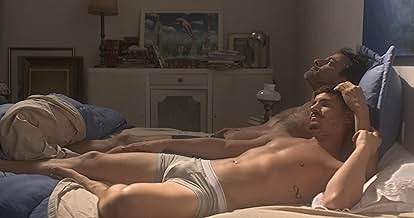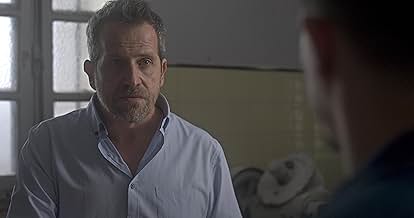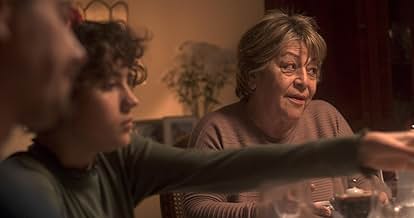CALIFICACIÓN DE IMDb
6.1/10
399
TU CALIFICACIÓN
Agrega una trama en tu idiomaComing out of he closet is never easy, but the gay son has already come out to his parents. They weren't happy, but they still love him. The son arrives home, only to learn that his partner ... Leer todoComing out of he closet is never easy, but the gay son has already come out to his parents. They weren't happy, but they still love him. The son arrives home, only to learn that his partner has dumped him.Coming out of he closet is never easy, but the gay son has already come out to his parents. They weren't happy, but they still love him. The son arrives home, only to learn that his partner has dumped him.
- Dirección
- Guionista
- Elenco
- Dirección
- Guionista
- Todo el elenco y el equipo
- Producción, taquilla y más en IMDbPro
Opiniones destacadas
It's one of those films suffering 'message before substance' symptom, which many young directors share. I get it, director wanted it to be a more up-to-date family drama, where still the acceptance of truth and love eventually prevail... But as a whole, the delivery is weak and the happy-ending was in a hurry.
I like that each and every family member has distinctive character and story. But having spent so much time for various troubles in the family to finally surface, there was no real development and resolve. We are suddenly presented with all happy and smiling ending, but I had to ask if any of them actually learned anything and grew up in any way. Would Manuel be really happy back in the small hometown and with slightly overbearing family? Would his parents finally not mind letting other family and neighbours know their son is gay? Would Manuel's brother, who was more or less forced into the marriage by the situation, be really happy?
PS. Actor who played Manuel is cute, but it clearly shows that he never in his life cut vegetables or used a whisk. Cooking is supposed to be the character's real passion, and anybody on the set with a slightest idea of how to cook could have given him a 5 min lesson as how to use a knife and a whisk. Such small details determines whether a film feels real or fake.
I like that each and every family member has distinctive character and story. But having spent so much time for various troubles in the family to finally surface, there was no real development and resolve. We are suddenly presented with all happy and smiling ending, but I had to ask if any of them actually learned anything and grew up in any way. Would Manuel be really happy back in the small hometown and with slightly overbearing family? Would his parents finally not mind letting other family and neighbours know their son is gay? Would Manuel's brother, who was more or less forced into the marriage by the situation, be really happy?
PS. Actor who played Manuel is cute, but it clearly shows that he never in his life cut vegetables or used a whisk. Cooking is supposed to be the character's real passion, and anybody on the set with a slightest idea of how to cook could have given him a 5 min lesson as how to use a knife and a whisk. Such small details determines whether a film feels real or fake.
This is a beautiful he told story that only the Spanish or French can do! BIEN HECHO!
Watched this during the Tampa International Film Fest. The storyline is good, the lead actor did a great job. Moves a bit slow and clunky at first but comes together nicely. The film is really about relationships with family and their expectations. Liked the ending.
Summary:
This dramatic comedy effectively rounds out a story about the "return to payment" where the reconfiguration of family ties after coming out of the closet is combined with the theme of the prodigal son, professional vocation, future work, reunions and pacts and family management, forming a dynamic that does not necessarily have to do only with inbreeding village environments.
Review:
Manuel (Facundo Gambandé) is an architecture student. The film begins with him saying goodbye to his partner who is going to live in Europe. He then undertakes a trip to his hometown (Villa Mercedes, San Luis) to visit his parents, who are going to celebrate their silver wedding anniversary, and request money to travel and meet with his partner. He had not seen them since he had come out of the closet at a family dinner, which led to an argument and his departure from town on bad terms with his parents.
One of the interesting aspects of the film by Nicolás Teté (also the author of the script) is that, precisely, it does not address the moment of coming out but rather the later; he describes how Manuel (whom his parents nevertheless receive very affectionately when he arrives) tries to rebuild the family bond and put it in new terms; a family with a good time, since his father (Diego de Paula) owns a pasta factory.
Another finding is that Manuel is discovering that the family hides a secret, related to an absence that is increasingly being felt in the story, configuring another family problem that somehow "competes" and interferes with his and repeatedly shifts the leading role. Family that he intended and makes the general picture more complex. In this context, Gambandé composes an endearing and at times naive Manu who demands to be understood and accepted, while disappointments and interference with his purposes do not stop.
Teté presents his story as a dramatic comedy, admirably combining both sides of the story and avoiding melodrama. The comedy tone is partly due to the comic imprint (in the best sense) that the character of the mother María Fernanda Callejón gives to in a great performance, and to that displacement mentioned above that also becomes the dramatic core. There is a series of dialogues that exhibit great naturalness, enhanced by several of them being filmed in long still shots.
With all these components, the film achieves a story about the "return to payment" where the reconfiguration of family ties after coming out of the closet is combined with the theme of the prodigal son, professional vocation, future work, reunions and pacts and family management, forming a dynamic that does not necessarily have to do only with inbreeding village environments.
This dramatic comedy effectively rounds out a story about the "return to payment" where the reconfiguration of family ties after coming out of the closet is combined with the theme of the prodigal son, professional vocation, future work, reunions and pacts and family management, forming a dynamic that does not necessarily have to do only with inbreeding village environments.
Review:
Manuel (Facundo Gambandé) is an architecture student. The film begins with him saying goodbye to his partner who is going to live in Europe. He then undertakes a trip to his hometown (Villa Mercedes, San Luis) to visit his parents, who are going to celebrate their silver wedding anniversary, and request money to travel and meet with his partner. He had not seen them since he had come out of the closet at a family dinner, which led to an argument and his departure from town on bad terms with his parents.
One of the interesting aspects of the film by Nicolás Teté (also the author of the script) is that, precisely, it does not address the moment of coming out but rather the later; he describes how Manuel (whom his parents nevertheless receive very affectionately when he arrives) tries to rebuild the family bond and put it in new terms; a family with a good time, since his father (Diego de Paula) owns a pasta factory.
Another finding is that Manuel is discovering that the family hides a secret, related to an absence that is increasingly being felt in the story, configuring another family problem that somehow "competes" and interferes with his and repeatedly shifts the leading role. Family that he intended and makes the general picture more complex. In this context, Gambandé composes an endearing and at times naive Manu who demands to be understood and accepted, while disappointments and interference with his purposes do not stop.
Teté presents his story as a dramatic comedy, admirably combining both sides of the story and avoiding melodrama. The comedy tone is partly due to the comic imprint (in the best sense) that the character of the mother María Fernanda Callejón gives to in a great performance, and to that displacement mentioned above that also becomes the dramatic core. There is a series of dialogues that exhibit great naturalness, enhanced by several of them being filmed in long still shots.
With all these components, the film achieves a story about the "return to payment" where the reconfiguration of family ties after coming out of the closet is combined with the theme of the prodigal son, professional vocation, future work, reunions and pacts and family management, forming a dynamic that does not necessarily have to do only with inbreeding village environments.
The cinematography is very static, you won't see many cuts or different camera angles, which could be an artistic choice or a budget constaint, but it's not necessatily a bad thing. Speaking of budget constaints, a lot of action is shown off-screen. For example there will be a party but you never see the non-main cast guests, it can be a bit bothersome sometimes, as the movie is not really a "shut off from the outside world" type of movie. There is also a funny sequence at the beginning, where the characters are going out for a jog, and it's obvious that every shot is recorded at the same block.
Sometimes a character will be friendly, just to turn confrontational in the next scene, without indication that the friendliness was fake. This is not necessarily the actors' fault, it's also a script problem. This is also apparent when characters will make a fuss about insignificant things, and you're supposed to take it seriously. Another sign of a posible script problem is when at the end the main character shows some traits that make him seem like an asshole, which I'm not sure if they were intentional.
So far I've been kinds negative, but even with it's faults the movie is enjoyable, you can relate with the characters and situations as they are common to many families, like going back to your hometown, talking about sex to your sibling, having a judgemental grandma, having a dissappointed parent, or having a one sided relationship. The movie does have heart in it.
Sometimes a character will be friendly, just to turn confrontational in the next scene, without indication that the friendliness was fake. This is not necessarily the actors' fault, it's also a script problem. This is also apparent when characters will make a fuss about insignificant things, and you're supposed to take it seriously. Another sign of a posible script problem is when at the end the main character shows some traits that make him seem like an asshole, which I'm not sure if they were intentional.
So far I've been kinds negative, but even with it's faults the movie is enjoyable, you can relate with the characters and situations as they are common to many families, like going back to your hometown, talking about sex to your sibling, having a judgemental grandma, having a dissappointed parent, or having a one sided relationship. The movie does have heart in it.
¿Sabías que…?
- Bandas sonorasTu Veneno
Music by Fernando Lopez Rossi
Performed by Natalia Oreiro
Courtesy of Sony Music Entertainment Inc.
Selecciones populares
Inicia sesión para calificar y agrega a la lista de videos para obtener recomendaciones personalizadas
- How long is A Skeleton in the Closet?Con tecnología de Alexa
Detalles
- Fecha de lanzamiento
- País de origen
- Sitio oficial
- Idioma
- También se conoce como
- A Skeleton in the Closet
- Productora
- Ver más créditos de la compañía en IMDbPro
- Tiempo de ejecución1 hora 43 minutos
- Color
- Relación de aspecto
- 1.85 : 1
Contribuir a esta página
Sugiere una edición o agrega el contenido que falta



















